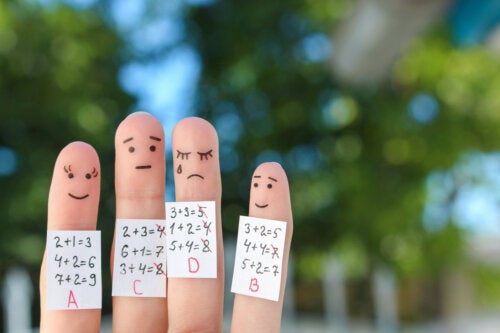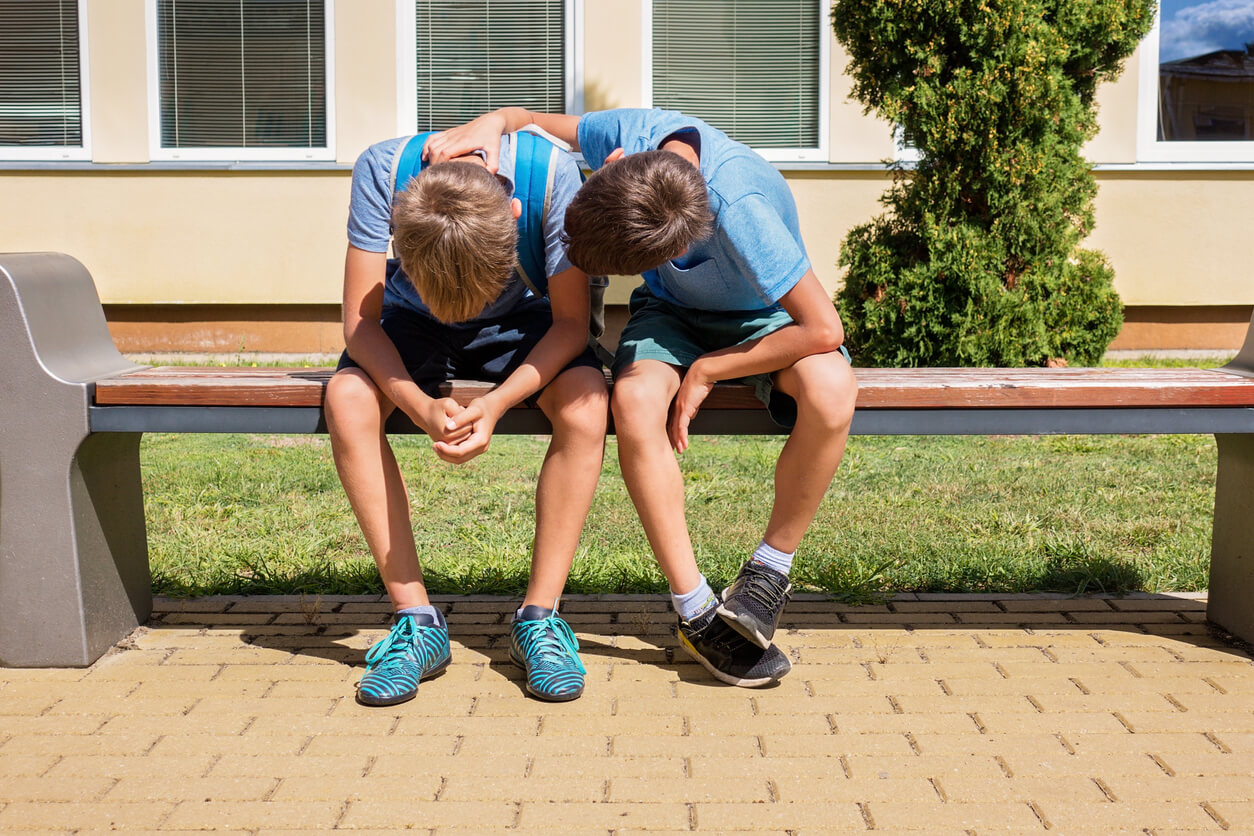How Grades Affect the Self-Esteem of Children

Self-esteem refers to one’s self-worth, to our ability to see ourselves as capable and valuable. It’s formed over time and from different experiences and is one of the fundamental pillars of our mental health. Therefore, it’s worth taking a few minutes to understand how grades affect the self-esteem of children.
Undoubtedly, academic performance is a factor that affects the emotional well-being of children and adolescents. Even so, for many, grades are evaluated in isolation, without context, as if they were a result that’s reached in a linear way and not through effort.
Grades affect the self-esteem of children
First of all, it’s important to know that children’s school performance depends on several factors. In other words, their understanding, the emotional climate at school and at home, and the possibility of being bullied, among other issues.
Therefore, the first reaction of parents to their children getting a bad grade should be very measured. Before getting angry or accusing them of laziness, it’s best to look at the whole context and try to detect some signs that indicate something else.
In turn, the emotional aspect of young people can’t be left aside when we talk about academic performance. Learning isn’t a merely rational act but is conditioned by the psychological sphere of the person.
On the other hand, we must take into account the fact that grades encourage competition among peers. Thus, a frequent question among them is what grade did you get on the exam? Therefore, it’s important to teach them that behind a grade, there’s much more than a number: There’s a learning process, a certain degree of effort, perseverance, and will.
You may be interested in: How Rest Affects Academic Performance

What to keep in mind about the self-esteem of children and their grades
Here are some recommendations to implement with your children when assessing their academic performance and promoting their self-esteem.
Offer them help
When your children come home with a bad grade, the first thing you should do is ask them what happened. Surely, through empathetic conversation and active listening, you’ll find more answers than with your assumptions.
Second, give them your support to overcome the difficulties, either to teach them to be more organized or to assimilate concepts better with the most appropriate study techniques for them. For some, it’s easier to listen to someone talk, while for others it’s better to draw concept maps or make summaries.
Don’t suppress their leisure time
Many times, adults take away their children’s favorite activities when they come home with a bad grade as if they needed more time to optimize their studies. Children and adolescents need moments of recreation and fun, as these are precisely the components that will help them face school obstacles, release energy, and motivate them to keep going.
Not only will punishing them and taking away something they enjoy make them reject studying even more, it won’t solve the problem in question. However, if your child doesn’t study because they spend too many hours playing sports, you can help them manage their time better.
Reinforce your children’s strengths
Good self-esteem allows us to mobilize resources to solve complex situations and overcome obstacles. Therefore, it’s good to recognize children’s efforts to learn and encourage each of their achievements.
Educate in values
It’s important to transmit the message that a grade is no reason to belittle someone else or believe oneself to believe oneself superior to other people. On the contrary, it’s crucial to strengthen the collaborative spirit and reinforce the fact that everyone can learn from and teach one another.
You may be interested in: Positive Affirmations for Children’s Self-esteem

Say “no” to labels
“Lazy”, “stupid“, “scatterbrained”, etc. are labels that are often heard and are quite harmful. As adults, we tend to use them in order to get kids’ attention as if they would wake up. On the contrary, the effects of our words can be very damaging and even make them feel like real failures.
Although grades can be an indicator of performance, they’re not the only parameter. It’s important to recognize other key aspects, such as the ability to think and express their own opinions, to question situations, to have a critical and creative spirit, and to find their own answers.
In short, schools should be a place where, in addition to learning mathematical algorithms or spelling rules, we can also acquire life skills.
Finally, we should also review the demands and expectations we have of our children to avoid overloading them. Sometimes we want them to be brilliant and we fill their time with studies: They leave school for piano lessons, French classes, and the like.
Undoubtedly, they end up becoming stressed children who are immersed in a dizzying pace to satisfy their parents’ desires. It’s valuable to respect their preferences, give them choices, and challenge them according to their age and possibilities.
All cited sources were thoroughly reviewed by our team to ensure their quality, reliability, currency, and validity. The bibliography of this article was considered reliable and of academic or scientific accuracy.
- Rodríguez-Garcés, Carlos René, Gallegos Fuentes, Marcelo, & Padilla Fuentes, Geraldo. (2021). Autoestima en Niños, Niñas y Adolescentes chilenos: análisis con árboles de clasificación. Revista Reflexiones, 100(1), 19-37. https://dx.doi.org/10.15517/rr.v100i1.43342
- Muñoz, A. S., Serrano, R. M., & Urbieta, C. T. (2016). La autoestima infantil, la edad, el sexo y el nivel socioeconómico como predictores del rendimiento académico. Revista de investigación en educación, 14(1), 33-66.
- Vargas Rubilar, J. A., & Oros, L. B. (2011). Parentalidad y autoestima de los hijos: una revisión sobre la importancia del fortalecimiento familiar para el desarrollo infantil positivo. Apuntes Universitarios. Revista de Investigación, núm. 1, julio-noviembre, 2011, pp. 155171